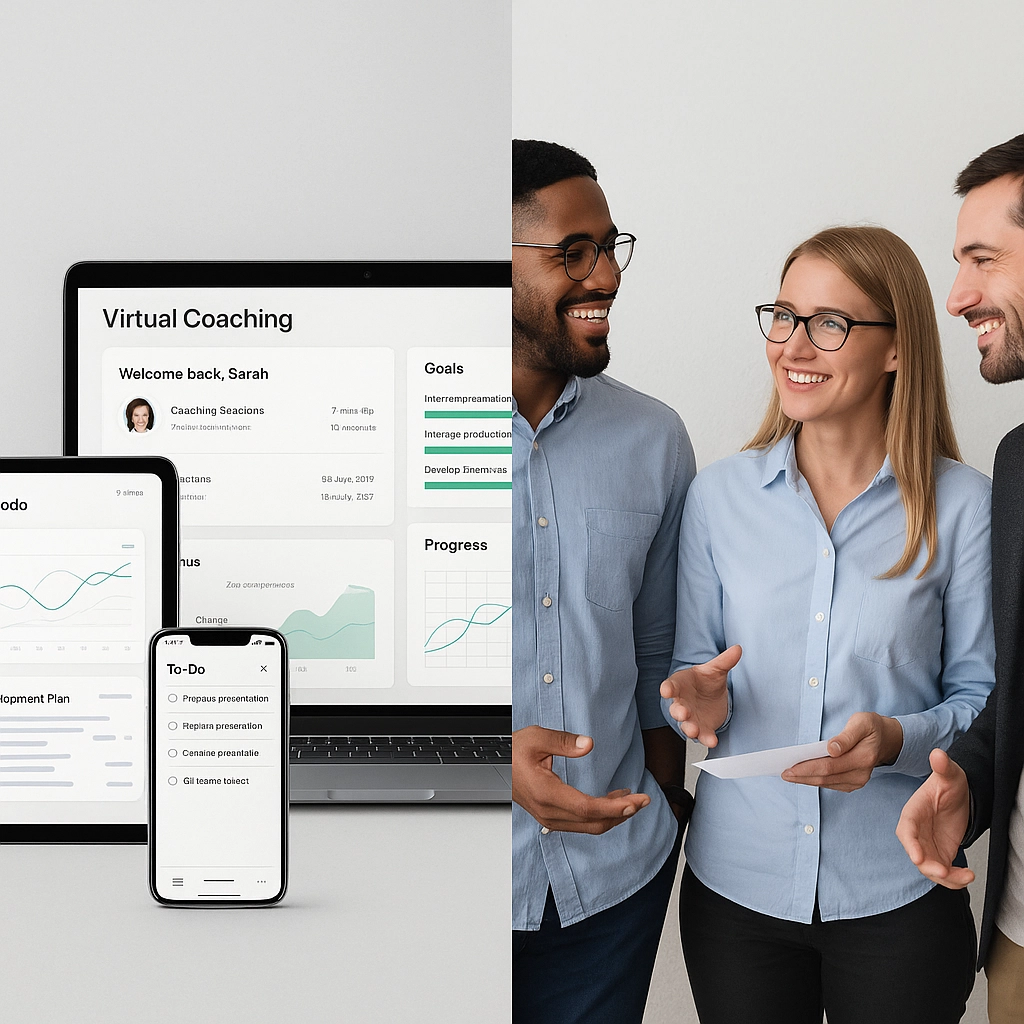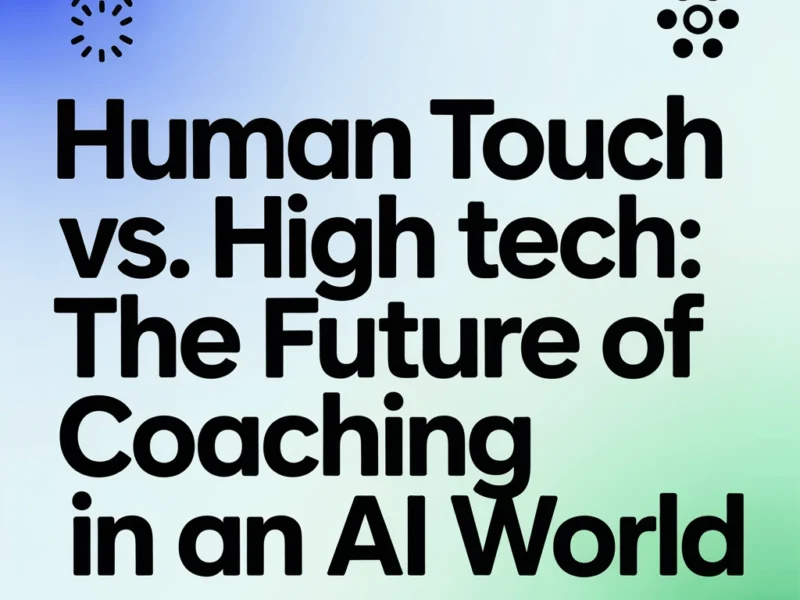In today’s rapidly shifting landscape, coaching is experiencing a transformation that few could have predicted a decade ago. Digital platforms and artificial intelligence (AI) are making coaching more accessible and data-driven than ever. At BHS & Associates, we’re seeing firsthand how both high-tech advancements and good old-fashioned human connection are shaping the next generation of growth—personally and professionally. So what’s the ultimate future look like? Let’s unpack the state of play, what’s working, and what’s just getting started.
The Tech Revolution Arrives in Coaching
Walk into any coaching session these days—whether it’s leadership development, career change, executive mentoring, or wellness—and you’ll likely spot digital tools at the heart of the experience. From simple scheduling apps to AI-driven personality insights and progress dashboards, high-tech touches are now standard for coaches and clients alike.
AI-powered tools offer an impressive toolbox:
- Automated scheduling and reminders free up time for deeper conversations.
- Chatbots and digital check-ins provide just-in-time support between sessions.
- Data-driven progress tracking gives both coach and client real-time feedback.
- Emotion analysis tools, like Fireflies or Vondy, spot changes in tone and sentiment.
- AI-generated content and follow-ups help coaches personalize learning material.

In specialized areas like sports or leadership, AI systems crunch massive amounts of data—think video analysis of a golf swing or digital audits of meeting behavior—to pinpoint growth areas. Even for personal development, AI-driven journaling and reflection guides offer helpful prompts when clients need structure.
The rise of these systems means coaching can be faster, smarter, and—sometimes—more affordable. No more waiting until next week’s session to get that “aha” moment; tech-enabled coaching often provides insights on demand.
The Magic of Human Connection
Here’s the thing, though: take away the human touch, and coaching loses its spark. Real change—a shift in mindset, breaking bad habits, stepping up in confidence—still hinges on a genuine connection between people.
What makes a great coach can’t be automated:
- Empathy: Sensing what’s not being said. Picking up on subtle changes in energy.
- Intuition: Reading between the lines to tailor advice in the moment.
- Support: Providing validation, encouragement, and accountability when things get tough.
- Trust & rapport: Building a safe space where clients feel seen—no filters, no bots.
Organizations that use a blend of people and technology see the difference. Studies show that human-centered, tech-enabled programs achieve satisfaction rates as high as 98%. Participants say the personal interaction is often what makes the experience memorable and life-changing. In fact, companies report higher employee retention (up to 20% above average) when coaching keeps the human piece at its core.
Real talk: no app can read the room, chuckle with you, or offer a much-needed pep talk after a rough week quite like a seasoned coach. There’s still no substitute for authentic, person-to-person growth.
The Best of Both Worlds: The Hybrid Coaching Model
Rather than a battle between humans and machines, the new wave of coaching is all about collaboration. The most successful programs use tech to handle the busy work and sharpen insights, freeing up coaches to focus on deep transformation.
What does this hybrid approach look like in practice?
- AI does the heavy lifting: Scheduling, paperwork, transcribing sessions, sending reminders, and even summarizing action items—all efficiently managed by smart systems.
- Humans provide the heart: Coaches dig into the “why,” challenge limiting beliefs, and tailor their approach based on what makes each client tick.

With tech streamlining the details, coaches invest their energy in high-impact conversations—the type that spark breakthroughs and build confidence for the long haul. It’s not just more efficient; it’s more personalized, accessible, and scalable.
This synergy is especially powerful for group or organizational coaching. AI can analyze team dynamics, suggest strategies for inclusive communication, or flag burnout risks. Meanwhile, human coaches build culture, bridge differences, and keep values front and center.
Looking Ahead: What’s Next for Coaching & AI?
We’re still in the early innings, but the runway for innovation in coaching is enormous. Here’s what’s on the horizon:
-
AI Sidekicks Become Standard
By 2030, almost every coach will have an AI “assistant” for scheduling, progress tracking, and nudging clients between sessions. Routine questions? Automated. Deep discovery work? Still human. -
Predictive Coaching
Imagine AI tools that spot patterns before you do: tracking emotional ups and downs, flagging engagement drops, or identifying skills gaps. These systems will surface actionable insights faster than ever. -
Virtual Reality & Real-Time Feedback
Picture role-playing difficult conversations in a hyper-realistic VR environment, or receiving gentle nudges when you’re falling into old (unhelpful) habits—right in the moment. -
AI as Your Coach?
Some companies are building digital versions of real coaches, available to answer questions 24/7 and guide clients in between human-led sessions. While the technology is evolving fast, it’s clear most people still want a person at the heart of their journey. -
Greater Inclusion & Access
AI will democratize coaching—making it easier to serve people from all backgrounds, across time zones, and at all career stages. No more gatekeeping success and personal growth.

The Challenges and Opportunities Ahead
As awesome as these trends are, let’s not gloss over the hurdles:
- Data privacy: AI-powered coaching collects a ton of personal information. Protecting confidentiality is a must.
- Ethical boundaries: Machines can crunch data, but humans must set the ground rules—especially for sensitive topics like mental health, leadership development, and DEI (diversity, equity, and inclusion).
- Quality control: Not all AI tools are created equal. Coaches and organizations need frameworks for vetting and quality assurance.
- Staying human: With instant answers at our fingertips, it’s tempting to skip the hard emotional work. The best coaching will keep empathy and vulnerability front and center.
The opportunity: blended coaching doesn’t just scale up impact—it also helps coaches themselves. With AI handling routine or repetitive tasks, coaches can devote more energy to growth, continuing education, and meaningful, creative work.
The Coaching Sweet Spot: Empathy + Intelligence
At BHS & Associates, we believe the future isn’t about pitting people versus algorithms. It’s about harnessing the best of both: high-tech tools that amplify human wisdom, paired with coaches who lead with empathy and courage.
Want to see this in action? Dive into our coaching programs and inspiration stories on our blog or discover how authenticity and vulnerability drive real results here.

The core takeaway: When AI supports rather than replaces the human touch, everyone wins. The future of coaching will be more accessible, insightful, and deeply personal than ever—and we can’t wait to build it with you.
Ready to explore a coaching journey that stays true to you in an AI-powered world? Reach out to BHS & Associates anytime—let’s create your next breakthrough, together.


 Storytelling That Inspires: Using Purpose-Driven Narratives to Energize Your Organization
Storytelling That Inspires: Using Purpose-Driven Narratives to Energize Your Organization